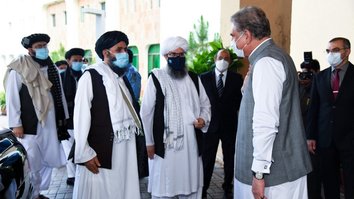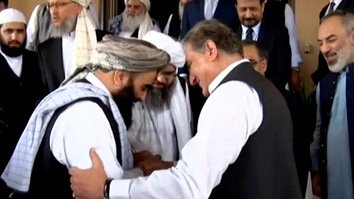ISLAMABAD -- Pressure is increasing on the Afghan government and the Taliban to start intra-Afghan peace talks, as the insurgents claimed another deadly bombing in Balkh Province.
Pakistani Foreign Minister Shah Mahmood Qureshi at a meeting in Islamabad Tuesday (August 25) urged senior Taliban leaders to start delayed peace talks with Kabul.
Qureshi "emphasised the implementation of the US-Taliban peace agreement, in its entirety, paving the way for the earliest possible commencement of intra-Afghan negotiations," Pakistan's Foreign Ministry said in a statement.
The Taliban's chief negotiator, Sher Mohammad Abbas Stanekzai, told Mashal Radio on Wednesday (August 26) that intra-Afghan negotiations could begin at any moment.
![Pakistani Foreign Minister Shah Mahmood Qureshi (right) walks next to Taliban negotiator Mullah Abdul Ghani Baradar (second left) in Islamabad on Tuesday (August 25). [Pakistani Foreign Office]](/cnmi_st/images/2020/08/26/25720-t2-585_329.jpg)
Pakistani Foreign Minister Shah Mahmood Qureshi (right) walks next to Taliban negotiator Mullah Abdul Ghani Baradar (second left) in Islamabad on Tuesday (August 25). [Pakistani Foreign Office]
![Dozens of religious scholars and civil society activists gather August 21 in Pul-i-Khumri, Baghlan Province, to urge the Taliban to start direct talks with the Afghan government for the sake of Muharram. [Noorgul Andarwal]](/cnmi_st/images/2020/08/26/25721-a__1-585_329.jpg)
Dozens of religious scholars and civil society activists gather August 21 in Pul-i-Khumri, Baghlan Province, to urge the Taliban to start direct talks with the Afghan government for the sake of Muharram. [Noorgul Andarwal]
Continued Taliban violence
The meeting between Qureshi and the Taliban delegation led by Mullah Abdul Ghani Baradar, the group's co-founder who spent eight years in Pakistani custody, came shortly after a Taliban-claimed suicide bombing near an Afghan National Army base in Balkh Province.
In a separate incident August 25, gunmen in Kabul shot and wounded Saba Sahar, an Afghan actress and women's rights campaigner.
The Taliban and Afghan government had signalled they were prepared to launch negotiations immediately after Eid ul Adha, which ended earlier this month, but the process became bogged down over the prisoner swap.
"The Taliban's emphasis on continuation of violence poses challenges to peace opportunities," President Ashraf Ghani said, according to his spokesman Sediq Sediqqi.
"The Taliban should give up fighting and killing Afghans, accept a ceasefire and start direct talks with the government of Afghanistan," he added.
Abdullah Abdullah, who heads the Afghan national reconciliation council, said that Pakistani Prime Minister Imran Khan invited him to visit and that he plans to travel to Pakistan soon.
"We expect the Pakistani government to take practical steps and co-operate with the Afghan government and the international community to help bring stability in the region," he told AFP.
Pakistan's influence
Although Pakistan can advise the militant group, it has limited influence, said journalist Sami Yousafzai of London.
"Yes, the meeting will have some effects but not to the extent the international community expects, particularly in context of Pakistan's influence over the Taliban," he said. "However, Pakistan has the capability to advise the Taliban, which the Taliban sometimes accept and sometimes reject."
In addition, the Taliban "show no flexibility sometime even over small issues", he added. "For example, when the Kabul government released more than 5,000 prisoners", the Taliban focused on the release of six particular prisoners.
"They should move on," he said of the Taliban.
"As [US Special Representative for Afghanistan Reconciliation Zalmay] Khalilzad has said, instead of insisting on the release of these six prisoners, the Taliban should offer an alternative list [of prisoners to be freed] since some European countries have reservations about them," he added.
"It's the reason the intra-Afghan talks have been delayed, and now Pakistan is seeking to find a solution to this and convey to the international community that it has influence over the Taliban," he said.
"The recent political development in Islamabad is a right step in the right direction," said Ashraf Ali, Islamabad-based journalist. "But any positive development will call for concerted and co-ordinated efforts on part of all the regional actors to join forces and pave the way for durable peace in war-torn Afghanistan in particular, and in the region at large."
Call to renounce violence
In addition to Islamabad's efforts, religious scholars and civil society activists in Baghlan Province are urging the Afghan government and the Taliban to start intra-Afghan peace talks for the sake of Muharram.
They gathered on August 21 in Pul-i-Khumri, Baghlan Province.
"We ask our Taliban brothers to stop killing innocent people in observance of the month of Muharram and begin peace talks," said Maulawi Sebghatullah Muslim, a religious scholar in Baghlan Province.
"The international community and the Afghan government have provided all the facilities for you so that you can come and discuss your expectations," Muslim said, addressing the Taliban.
Maulawi Abdul Ghayyas Ahmadi, another religious scholar at the gathering, called on the Taliban to disregard their personal goals and renounce violence for the sake of God.
"Let's sit at a negotiating table and reach a solution on all the issues," said Maulawi Sardar Wali, a member of the Baghlan Ulema Council.
"There is no need for foreigners," he said. "There is no need for the East or West to mediate if we arrive at an agreement."
"We can build Afghanistan ourselves," Wali said.
Ahmad Khalid Farahmand, a civil society activist in Baghlan Province, called on the Taliban to prove to the Afghan people that they are acting independently and in the interest of Afghanistan.
"If you are not puppets of other countries, you can join the Afghans at the negotiating table and freely raise your opposing views with the Afghan people so that you can seek a solution for them," he said.
Sacrificing for peace
"As we are nearing peace, both parties need to make sacrifices at this critical time," said Abdul Jalil Ragheb, a resident of Pul-i-Khumri.
"The remaining prisoners of the government and the Taliban must be released because the Afghan people are impatiently waiting for peace," he said.
"There is no excuse for the Taliban [to continue fighting], and they should come to the negotiating table and resolve their issues through legal channels," he added.
"The Taliban should make use of this great opportunity and give priority to national interests over their personal preferences," said Ghulam Yahya Ahrar, a civil society activist in Baghlan Province. "They first need to declare a ceasefire and then begin talks inside the country."
The Taliban have two choices: join the peace process or face defeat, said Ahmad Jawed Basharat, a spokesman for the Kunduz Police.
Afghan National Defence and Security Forces (ANDSF) have inflicted heavy casualties on the Taliban in Baghlan-e-Markazi and Doshi districts and Dand-e-Ghori, Dand-e-Shahabuddin and Chashma-e-Shir areas over the past month, he said.
"We responded to every attack of the Taliban at our checkpoints, and they have withdrawn after seeing heavy casualties," he said.
"We ask the Taliban to join the peace process," Basharat said. "The security forces destroyed them in the past, and they will see a similar defeat in the future."
[Hedayatullah from Kunduz and Alam Zeb Khan from Islamabad contributed to this report.]

![Members of the Taliban delegation meet with Pakistani officials in Islamabad on August 25. [Pakistan Foreign Office]](/cnmi_st/images/2020/08/26/25728-taliban-585_329.jpg)







Pakistan should increase its pressures on Taliban so that the group declares ceasefire in Afghanistan and get ready for holding intra-Afghan talks. I think Pakistan can do so because Pakistani government has very much influence over Taliban.
Reply2 Comment
Taliban will never declare a ceasefire unless they come under pressure from different countries of the world. This is possible, especially if the United States and the international community ask Pakistan to put pressure on Taliban to prepare for declaring a ceasefire and began talks. But the international community and the United States do not do so. I think the United States is also happy that the war and bloodshed continue in Afghanistan. If it is not happy, then why it does not put pressure on Pakistan or impose economic sanctions on it? If the United States puts a little pressure on Pakistan, it will lead to a decrease in violence and peace in Afghanistan. Arab countries should also feel responsibility and decide about the bloodthirsty war of Afghanistan and impose sanctions on Taliban. If Arabs are really Muslim and they have fear from God, they should solve the problem of Afghanistan. Over the past twenty years, thousands of people have been killed in Afghanistan, and thousands of more have become disabled. Thousands of women have become widowed and thousands of children have become orphan. The cause of them is the United States, Pakistan, Iran and the Arab countries. All these countries must fear from God and end the issue of war in Afghanistan.
Reply2 Comment